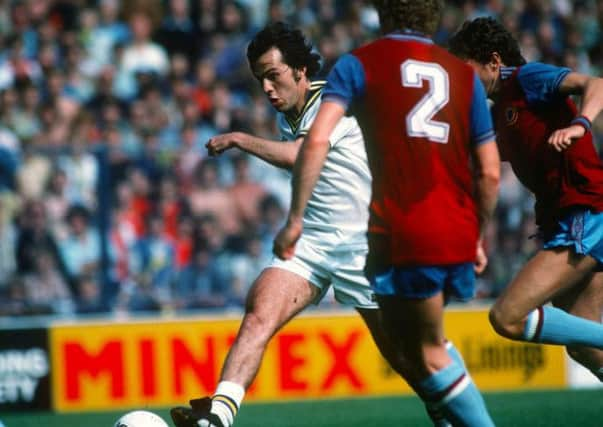World Cup - Cultured feet which never truly settled in Leeds mire


The hair is wispy and grey these days and the boyish features have gone – no longer the “good-looking lad” Allan Clarke recalls – but Sabella is recognisable still.
With no underdog in the fight in tomorrow’s World Cup final, some in Yorkshire will see him as a reason to align themselves with Argentina.
Advertisement
Hide AdAdvertisement
Hide AdIt is a tenuous link as links go. Sabella passed through Elland Road quickly and quietly, a silky midfielder who some of United’s supporters can just about remember.
Brian Flynn, a team-mate of his at the time, thinks Sabella would be a household name in Leeds had he hung around long enough for his reputation to spread. The relationship was far more fleeting.
“He was good enough to be a Leeds legend,” Flynn says. “I really mean that. His technical skills, his balance and his running were – as far as I saw – exceptional. He had a magnificent left foot and a pretty complete game. Over four of five years he’d have grown into a star.”
Born in Buenos Aires in 1954, Sabella was 7,000 miles from home in Yorkshire. Sheffield United were first to sign him, bringing him to England from River Plate during a transfer saga which became apocryphal over the years.
Advertisement
Hide AdAdvertisement
Hide AdThe story went that Sheffield United wanted Diego Maradona but fell £40,000 short of his valuation (the true figure was far higher). Sabella carried a more affordable price and was signed in 1978. He made people sit up at Bramall Lane – “above our level in all honesty,” as one of the club’s other players once put it – but could not negate the mediocrity around him.
His move to Leeds in 1980 was as much down to him as it was United’s manager, Jimmy Adamson.
Sunderland bid £600,000 for Sabella, but were offering him a career in the Second Division. In a higher league, Leeds suited him better – and Yorkshire had become a happy home, for the 25-year-old at least.
“Yorkshire’s a hospitable place and he was settled here,” Flynn recalls. “You didn’t get the sense of someone who was homesick or out of his comfort zone.
Advertisement
Hide AdAdvertisement
Hide Ad“He was very quiet, unassuming, but he’d get in for work early and do his thing without ever moaning. I’d say he was pretty content.”
The recurring theme among those who played with Sabella is that they liked him immensely.
“He’d done extremely well at Sheffield United,” Eddie Gray says. “The impression we had was that he’d been a bit of a hero down there.
“At the time there was a South American guy, Danny Bergara, who was bringing players like Alex across to England. He was a long way from home but the bigger problem for him was the football we played at the time. The style we adopted wasn’t made for a lad with Alex’s ability.”
Advertisement
Hide AdAdvertisement
Hide AdIn their own way, Leeds were as stagnant as Sheffield United.
Adamson was sacked within months of signing Sabella and with Clarke appointed as his replacement, United danced with relegation constantly. In an infertile environment for cultured feet, Sabella played 26 times and scored twice before leaving for Estudiantes and his native Argentina for £120,000.
“We were struggling in the league,” Flynn says. “It’s that old story – in difficult times, you do what needs to be done.
“This isn’t a criticism of the manager (Clarke) but with him it was completely different to Jimmy Adamson.
Advertisement
Hide AdAdvertisement
Hide Ad“We became more defensive and our tactics were all about getting results – which in fairness was the right policy.
“For a time it worked, but someone like Alex wasn’t going to fit into that. When you’re in relegation battles, sublime skill tends to get lost.”
Clarke remembers the situation differently. “I wanted to keep Alex,” he says. “He was a quality player, quite a special talent, and I think he was okay in England.
“He couldn’t speak a word of English when he came here but he taught himself the lingo at Sheffield United and that probably tells a story about how much he wanted things to work out.
Advertisement
Hide AdAdvertisement
Hide Ad“But he came to me one day and told me that his wife wasn’t settled. She was finding it tough. I thought straight away about a lesson I learned under our old manager, Don Revie – if you don’t have a happy wife, you don’t have a happy player.
“So I looked to get him back to Argentina and we did a deal with Estudiantes. That’s how football goes.”
Sabella left in January 1982 and few, if any, of his former Leeds team-mates have had contact with him since.
Flynn attempted to meet up with him in London recently but found that Sabella’s job as Argentina coach had predictably packed his diary.
“He’s got a bit on his plate these days,” Flynn jokes.
Advertisement
Hide AdAdvertisement
Hide AdIf Argentina beat Germany at the Maracana tomorrow night – an ambush in the back yard of their wounded Brazilian neighbours – he will have a World Cup on his CV too.
“In all honestly, I never saw him becoming a manager,” Flynn says. “I’m not entirely sure why but maybe I wondered if he was too talented to put up with coaching. When you’ve got the ability he had, football comes easily. Getting 20-odd players together and creating a team who win game after game is a different ball-game altogether. Even Maradona discovered that when he coached Argentina but Alex has risen to it. I’ll be quietly rooting for him tomorrow.”